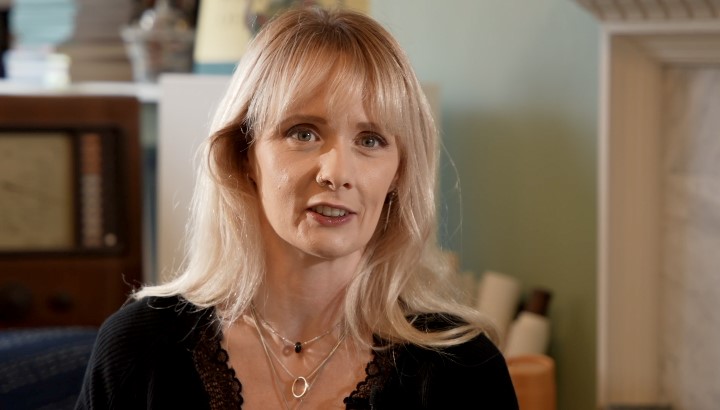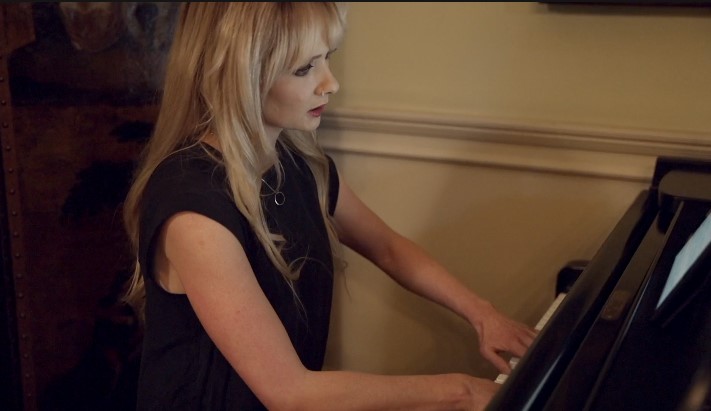British composer Stef Conner: Harmonizing worlds at her fingertips
When it comes to contemporary music, Stef Conner can be considered one of the most creative and innovative composers in the United Kingdom. She often blends modern music with British classical music and folk, creating enchanting melodies that bridge the past and present, securing her position in the world of composition.
During her youth, Stef went on a tour of China with her school and learned Chinese pronunciation, singing Chinese songs. The unique landscapes and local customs of both northern and southern cities in China left a profound impression on her, and the study of Chinese pronunciation laid the foundation for her later musical compositions. In the 9th Cambridge Xu Zhimo Poetry and Arts Festival held in Cambridge, UK, in the autumn of 2023, Stef Conner was invited to compose music for “Go", the seminal work of the Chinese New Moon School poet Xu Zhimo. She crafted melodies based on the pronunciation of the original Chinese poem and sang in both Chinese and English, skillfully and harmoniously blending Eastern charm with Western classical music. Conner received the Xu Zhimo Music Award for her outstanding performance.

Stef Conner (Photo/Geng Pan)
In an exclusive interview with People's Daily Online, Conner will take us on a journey through her wonderful world of music, tracing her musical influences, unique performance and composition experiences, insights into contemporary and classical music, and her expectations for future Sino-British international musical collaborations.
An unforgettable first trip to China
People’s Daily Online: Can you tell us about your journey into the world of music, composition, and what initially inspired you to become a composer and a musician?
Stef Conner: There wasn't a specific event that made me decide that I wanted to be a composer. It was more a sort of long process of realizing that I was a composer because I had decided I wanted to become a musician and I tried all sorts of different things, performing, writing about music, and all of the time I kept wanting to write more and more music, I couldn't stop myself. Eventually I think I just realized that that was what I was.
People’s Daily Online: So in addition to performing, are you doing some teaching?
Stef Conner: I teach music composition and folk song at the University of York and I have the privilege of working with two PhD students. Both of them are composers and I absolutely love teaching composition.
People’s Daily Online: You mentioned that you have been to China. Can you talk about your memories and experiences there?
Stef Conner: The first time I went to China I was very young. I was a teenager and students at my school had the opportunity to go to Shanghai to learn Chinese and we had three weeks of Chinese lessons every day and it was an amazing experience, it was a culture shock. Lots of the students who went on that trip went and studied Chinese at university.

Stef Conner (Photo/Geng Pan)
Later in life when I was a postgraduate student at the University of York, we had a wonderful collaboration with the conductor, Zhu Buxi, and we were able to go to China on tour. He conducted our choir and we toured many cities in China. I think we went three times and each time we were in China we had amazing coaching from fantastic Chinese singers as we were singing a program of music half in English and half in Chinese.
People's Daily Online: Do you have any memories of visiting Wuhan?
Stef Conner: I remember Wuhan very well. I absolutely loved it because we went to the museum and saw the Zeng Houyi Bianzhong, the big bronze bells from 433 BC, from the Zhou dynasty. The history of Wuhan was really inspiring and our teachers were from Wuhan, and they travelled around China with us, helping us with our pronunciation.
People’s Daily Online: Did you sing any Chinese songs when you were in China?
Stef Conner: We sang lots of Chinese songs. Probably the one that we sang the most and that we learnt the best is the famous Chinese song ‘Jasmine Flower’, so we all remember that, but we sang probably seven or eight pieces in Chinese, which was exciting.
People’s Daily Online: Did you notice large differences between the cities that you visited?
Stef Conner: I wish that I had more time to do tourism when I was in China because I would have liked to have spent more time meeting people, eating different food and seeing the sights. We did get little bits of time off and we did notice big differences because China's huge. I remember we went to Hangzhou to look at the beautiful lake and see some pretty sights.
The northwest of China I really liked, the food was interesting, and I remember the smell of wood smoke and of incense from walking around temples was interesting. Every city had a completely different character and different people, a different atmosphere.
The creative process and Xu Zhimo’s timeless brilliance
People's Daily Online: The process of composing music can vary greatly from one composer to another. What does your creative process look like?
Stef Conner: My creative process always starts with the text. I tend to fall in love with texts, even if it's an instrumental piece, even if I'm not planning on setting the text. That seems to be what I need. Everybody has to start somewhere. And then that develops into research, into deconstructing the text, thinking about the sound of it, thinking about the meaning of individual words, looking at the way it's structured, and thinking how I can create an interesting musical structure that reflects, and in some way expands on the sort of obvious structures in Western classical music that we inherited from the 17th and 18th centuries.

Stef Conner (Photo/ Geng Pan)
I think the wonderful thing about poetry is that it is always subjective, and there's always a level of abstraction. Poetry is about emotional connection regardless of how it happens.
People's Daily Online: You were invited to compose music for Xu Zhimo's poem "Go" for the 9th Cambridge Xu Zhimo Poetry and Arts Festival. How did you find the experience?
Stef Conner: It was really exciting to be invited to set a poem by Xu Zhimo, because I haven't worked on any music based on Chinese poetry for over a decade. Because I love Chinese poetry so much, I just thought: “Why can't I do it, I'm sure it's fine, I'm sure I'm good at it”. I was thrilled to be able to work with Xu Zhimo's beautiful words, because they have abstraction as well as an enchanting, mystical atmosphere, and the way he uses imagery of the kind of natural world to express human emotion, but in this very sort of objective way, because it's expressed through observations about nature and little atmospheric descriptions of natural phenomena. That really reminded me of everything I love about Tang Dynasty poetry, which is what drew me to Chinese culture in the first place.
I just tried to pay a little bit of attention to the tone contour of the poem in my musical setting. I don't think in contemporary Chinese music you have to follow the tones of the language, but that's very interesting to me as an English person, because obviously English is not a tonal language and that aspect of Chinese is kind of exciting and beautiful, so I was interested in moving up and down with the language, and trying to reflect the atmosphere of the poem in a musical setting. I love it when poetry provides a musical structure. I'm basing my melodic ideas on the tones of the language just because I find them interesting, and it sounds beautiful structurally. My friend Zhu Jie, my fellow PhD student, said someone had told him that if you recite a Chinese poem a hundred times then a melody will have composed itself, you will have decided how you are going to set it and I always thought that was really beautiful.
People's Daily Online: You received the Xu Zhimo Music Award. Do you think this will encourage you further?
Stef Conner: I was suddenly very nervous and terrified when I went into the Provost’s Lodge to perform my song for the Cambridge Xu Zhimo Poetry and Arts Festival because the room was full of personages such as Professor Alan Macfarlane, lots of scholars and artists, and the room was absolutely full of poets. I’d never seen so many in one place. I thought as I sat down at the piano to play, oh my goodness, what if I mess it up, but it was an amazing experience. What an opportunity to perform for such a diverse group of people.
I was flattered to receive an award from the Xu Zhimo Festival and I felt very encouraged by that, because it's been 10 years since I set any Chinese poetry to music, and I loved doing it. It was so inspiring, and it reminded me that for years I've had a dream project to work with Chinese singers, a Chinese choir and a historical linguist to set some Tang Dynasty poetry in Chinese pronunciation.
People's Daily Online : Do you think international poetry and art projects are important? If so, why?
Stef Conner: I think musical projects must be one of the best possible ways to foster mutual understanding between cultures. Because coming together to create art, especially music, as music uses your whole body when you sing together, you feel the harmony coming out of your body, so it's really an amazing bonding experience. It’s so inspiring and an excellent opportunity to strengthen friendships. I think making art together is the best possible thing that you can do to strengthen cross-cultural ties.
Photos
Related Stories
- China National Symphony Orchestra performs at Sydney Opera House
- Feature: Chinese music bands rock NYC with ever-evolving tapestry of Chinese youth culture
- Chinese music festival held in New York
- Flash mob playing Chinese instruments makes a stir in Paris
- Feature: China's symphony orchestra wins applause with premiere-filled performance in New York
- Chinese rock music festival draws big crowd in New York
Copyright © 2023 People's Daily Online. All Rights Reserved.









